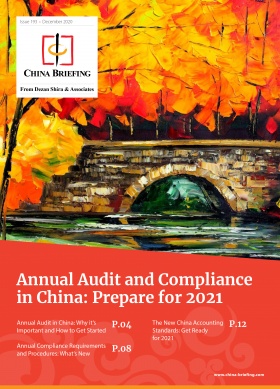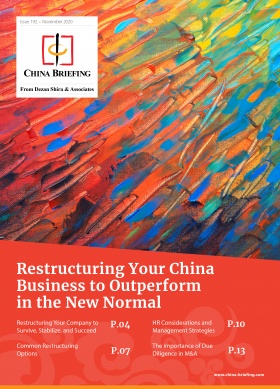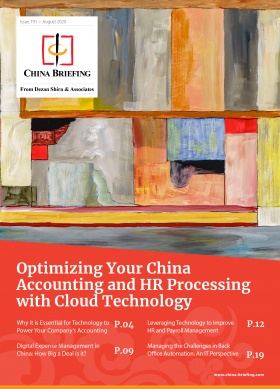Shanghai Pudong New Area Pilots “One Integrated License”
Since November 19, 2020, Shanghai’s Pudong New Area has started to pilot a program called “one integrated license”. The pilot program, lasting till the end of 2022, will help market entities enter specific industries through one integrated license, replacing the previous multiple ones.
According to the overall plan (Guo Han [2020] No.155), 31 industries in Pudong New Area, most of which are related to citizen’s daily life and consumption, will spearhead the integrated license reform, including (from A to Z):
- Accounting firms;
- Amusement parks;
- Bakeries;
- Bathing places;
- Beauty and hair saloons;
- Book stores;
- Cafeterias and teahouses;
- Construction project construction;
- Construction project supervision;
- Construction project engineering investigation and design;
- Convenience stores;
- Cosmetics manufacturing;
- Data center/cloud computing;
- E-commerce;
- Entertainment venues;
- Galleries;
- Gyms;
- Hotels;
- Internet service bars;
- Internet-based hospitals;
- Level I&II pathogenic microorganism laboratories;
- Made-on-site food;
- Mother and child supplies stores;
- Pharmacies;
- Production of disinfection products;
- Pubs;
- Restaurants;
- Supermarket;
- Small-sized catering;
- Singing and dancing entertainment places; and
- Theaters.
As an example, previously, to open a convenience store, one had to apply to different government departments for the food business license, alcohol retail license, drug retail license, record certificate for the business of class II medical devices, and tobacco monopoly retail license.
Now, the market entity only needs to apply for one sector-specific integrated license on the Shanghai municipal government’s integrated online platform.
Together with the reform, 25 administrative licensing items under the charge of the State Council departments will be processed and issued by local authorities in Pudong New Area, to simplify the approval procedures. These administrative licensing items include:
- Value-add telecom business license;
- Qualification accreditation of construction enterprises;
- Qualification accreditation of construction engineering design enterprises;
- Qualification accreditation of construction engineering investigation enterprises;
- Qualification accreditation of construction project supervision enterprises;
- Qualification accreditation of supervisors of highway engineering;
- Qualification accreditation of supervisors of highway mechanical and electrical engineering;
- Qualification accreditation of supervisors of special independent bridges;
- Qualification accreditation of supervisors of special independent tunnels;
- Qualification accreditation of supervisors of water conservancy construction projects;
- Filling of securities service business by accounting firms;
- Qualification accreditation of designers of civil air defense works; and
- Qualification accreditation of supervisors of civil air defense works.
Under the integrated license reform, license applicants can receive a customized notification letter online to learn how to be eligible and what application materials are required, and then submit the application via one single form, instead of multiple forms.
It is officially estimated that the reform will reduce the average application time for pilot industries from 95 working days to five working days, the number of application materials from 53 to 10, and the number of elements to fill out in the forms from 313 to 98. This could largely reduce the cost of entering a market.
Impact on businesses in Shanghai’s Pudong New Area
As early as July 2019, Pudong New Area had launched the “one integrated license” pilot program for 10 industries, including convenience stores, gym, hotels, restaurants, etc. However, the recent reform expands the number of beneficiary industries from 10 to 31.
Another important breakthrough is the devolution of power. The delegation of examination and approval rights are no longer confined to the jurisdiction of the Pudong New Area or Shanghai Municipality, but for the first time extended to central authorities.
For example, the examination and approval value-add telecom business license were originally under the responsibility of the Ministry of Industry and Information Technology (MIIT) and Shanghai Communications Administration; the filing of securities service business involved by an accounting firm is subject to the examination and approval by the China Securities Regulatory Commission (CSRC) and the Ministry of Finance (MOF); the qualification accreditation of construction enterprises was supposed to be approved by the Ministry of Housing and Urban-Rural Development. Now, to energize the market, the State Council has determined that it will delegate the central power to local authorities of Pudong New Area, and at the same time improve regulations to enhance enforcement quality.
Shanghai’s Pudong New Area has long been the pioneer of China’s reform and opening up. The one integrated license reform was announced by the State Council, right after the 30th anniversary of the development and opening up of Pudong – the area occupying just 1/8000 of China’s land was reported creating 1/80 of China’s GDP and 1/15 of all foreign trade value for the country in 2019.
At present, the reform experience of Pudong New Area is gradually being replicated and promoted nationwide. Some localities have begun to explore similar reforms, including Nanjing Area of Jiangsu Free Trade Zone, Hunan Free Trade Zone, Shenyang City of Liaoning Province, Heze City of Shandong Province, etc.
As China continues to find ways to cut administrative red tape to improve the business environment, it is expected that more domestic and foreign market players will take advantage of the regulatory easing in the country’s dynamic market.
About Us
China Briefing is written and produced by Dezan Shira & Associates. The practice assists foreign investors into China and has done so since 1992 through offices in Beijing, Tianjin, Dalian, Qingdao, Shanghai, Hangzhou, Ningbo, Suzhou, Guangzhou, Dongguan, Zhongshan, Shenzhen, and Hong Kong. Please contact the firm for assistance in China at china@dezshira.com.
We also maintain offices assisting foreign investors in Vietnam, Indonesia, Singapore, The Philippines, Malaysia, Thailand, United States, and Italy, in addition to our practices in India and Russia and our trade research facilities along the Belt & Road Initiative.
- Previous Article China to Undertake Massive 10,000 km Domestic Rail Network Expansion to Link Key City Clusters
- Next Article China Optimizes Prepayment of Individual Income Tax by Some Taxpayers








